This essay was originally published as part of a submission for David Perell’s Write of Passage programme.
“Man is a deterministic device thrown into a probabilistic universe. In this match, surprises are expected.”
- Amos Tversky
Friends, I’m breaking the fourth wall this week. I’m in the final stretch of Write of Passage, and I have exactly three units of brain juice left to expend on this final assignment. I’m not sure how many I started with (either before this course, or at the moment of my birth), but I’m certain I have no more than three (3) to work with at this moment of writing.
I’m tired.
I’ve written four essays in the last four weeks that I’m quite proud of, that I know I’ll grow to love. But I’m getting strong kick-this-to-the-curb vibes from this one. Even as I write this, it feels like I’m conceiving my bastard step-child in real time. I’m on a dusty heart-shaped bed in some seedy motel, staring up at the mirror on the ceiling, vaguely aware that this is probably a mistake.
Part of the reason for this malaise is that I know I have a deadline in three hours. So my brain looks something like this.
I wish I could claim authorship for the masterpiece above, but the truth is I’ve plucked it from Tim Urban’s iconic 2013 essay on Why Procrastinators Procrastinate. The gentleman on the left is the Panic Monster, in the middle is the Instant Gratification Monkey, and on the right is the Rational Decision Maker. All very serious figures.
For a naturally gifted procrastinator like myself, it is only in the storm of a looming deadline that the Panic Monster takes over, and the Instant Gratification Monkey is banished from the driver’s seat till the job gets done.
This is me trying to get the job done.
Tim’s Procrastination essay was published ten years ago (almost to the day) on his blog Wait But Why. It has since become a canonical part of Internet lore - the Holy Text on procrastination, if you will. His TED Talk based on the same essay has been viewed almost 70 million times, becoming the third-most watched presentation in the entire history of TED.
Those kinds of numbers have become par for the course for Tim Urban and Wait But Why (WBW). Over the last decade WBW has transitioned from cutesy website to celebrated institution. It is a carnival for curious minds, a place where whimsy and wisdom live in harmony. WBW blogposts have been shared hundreds of millions of times over the years, with the site receiving around 10 million visitors every month at its peak.
Tim has carved out a niche writing long-form essays on everything from serious science-y topics like AI and aliens, to general life advice on how to pick a spouse or a career, to pointed social commentary on things like religion and politics, to his trademark musings on the dark secrets of birds, the awkward things about email, and why you shouldn’t care what anyone else thinks.
Though he would loathe to admit it himself, he’s earned the right to be considered an all-time great writer and thinker of the Internet Age. He’s built his reputation around being able to articulate (and illustrate) what everything else is thinking. Each WBW piece is peppered with a generous helping of playfulness and stick figure-ness, making even the most complex and hairy topics universally accessible.
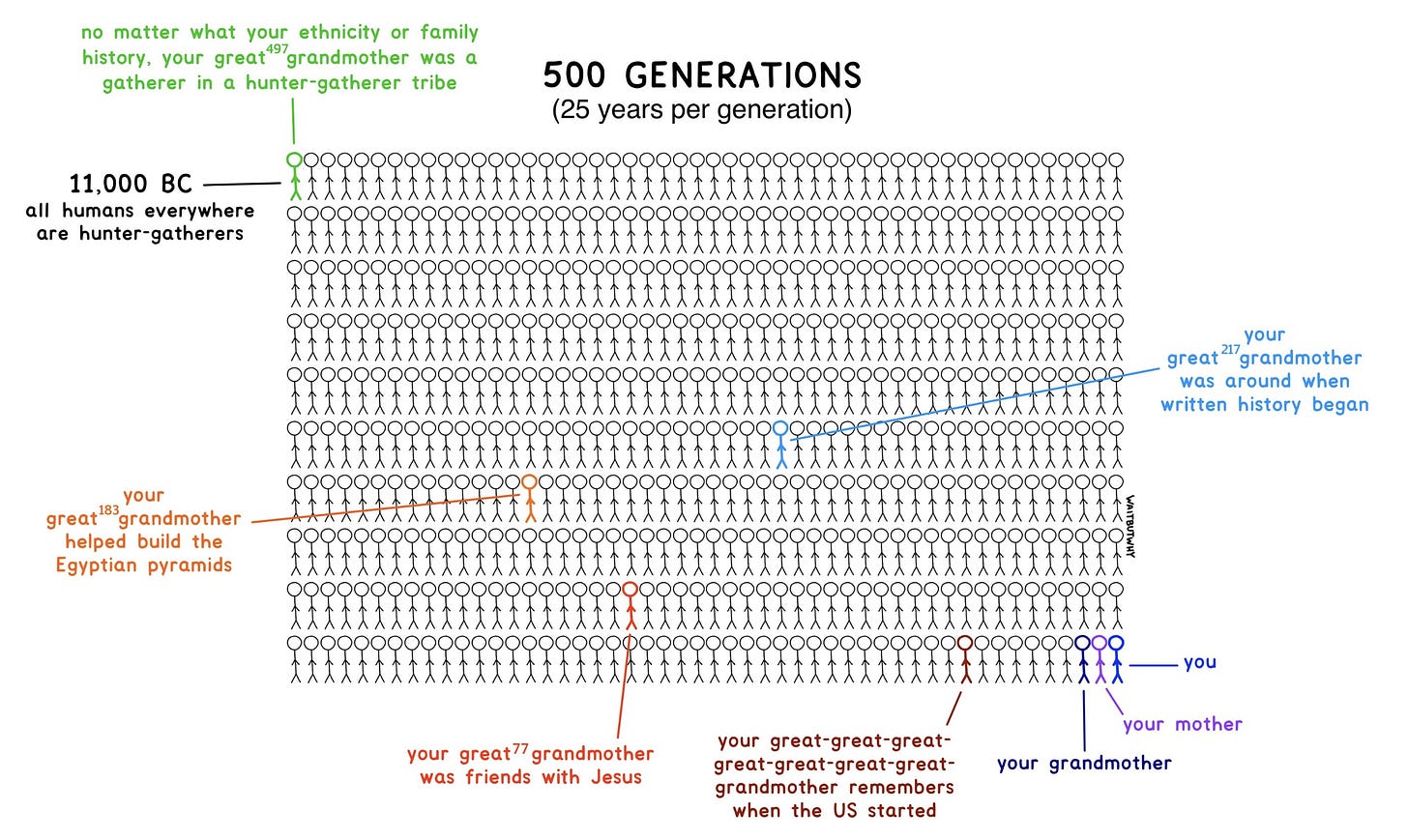
When I was first introduced to Wait But Why in 2013, I thought Tim Urban had the coolest job in the world. As a kid who loved reading, WBW was right up my alley. It was an antidote to the scourge of listicles, and it seemed to be in violation of everything else that was happening online at the time. Twitter, Instagram, Snapchat (and later TikTok) all seemed to be dressing themselves up to take advantage of people’s shortening attention spans. WBW, on the other hand, was churning out lengthy blogposts of 3,000 words, 10,000 words, 30,000 words, and 90,000 words, openly flouting the newly emerging rules on digital virality.
That staunch commitment to his own path and his own curiosity meant that Tim had a field to himself. He was in a lane of one. His blogging habit would turn him into Internet royalty over the next decade. He would garner the attention of luminaries like Elon Musk, who granted him unparalleled access (at the time) for a series of blogposts about Musk’s various businesses. He made a nifty app called Universe in a Nutshell, in partnership with Youtuber Kurzgesagt, that lets people explore the tiniest nooks and crannies of our universe. And earlier this year he published his (bestselling) first book called What’s Our Problem, a meditation on the pathologies that ail modern societies.
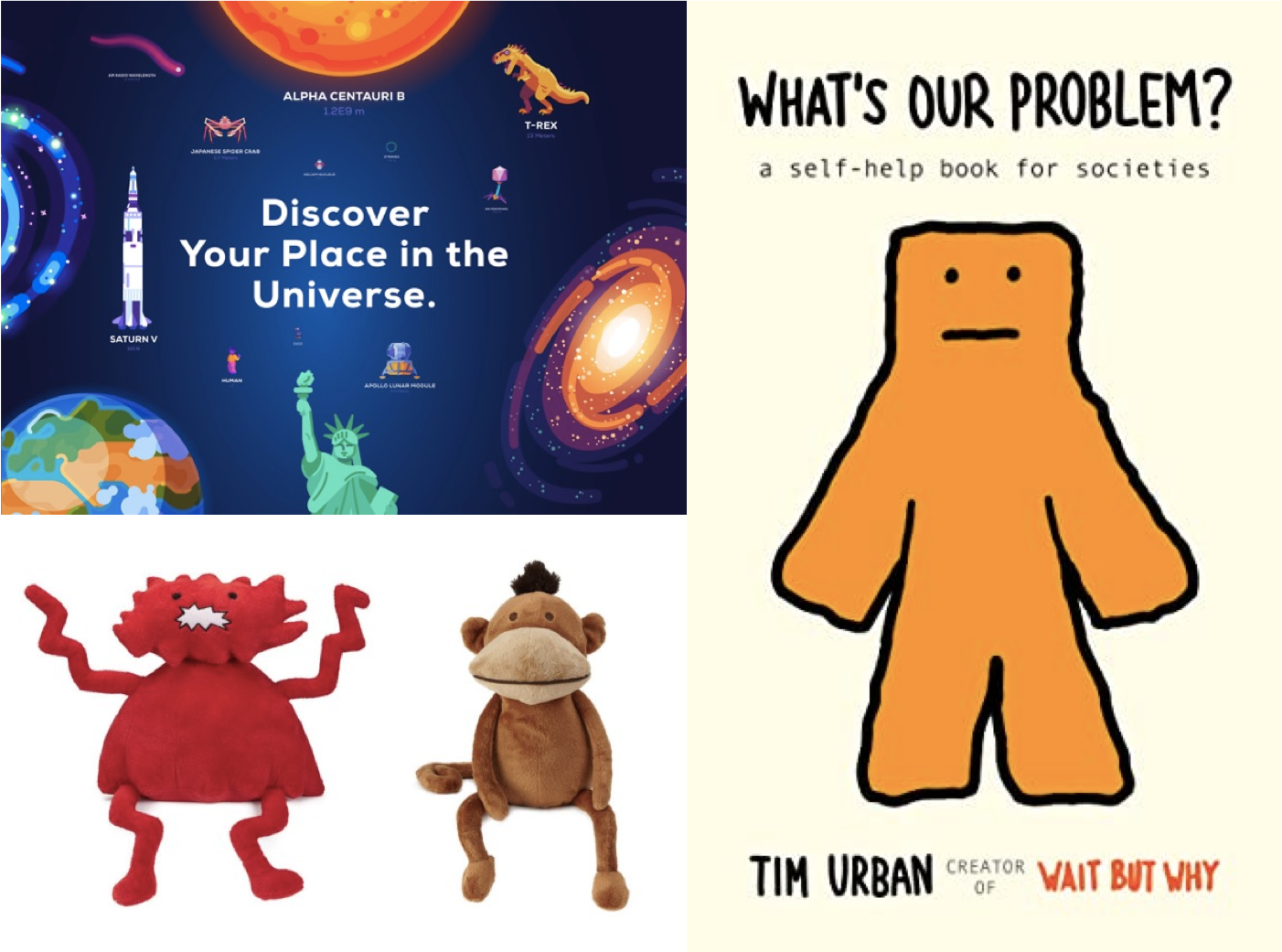
What’s remarkable is that none of this was part of the plan. When childhood best friends Tim Urban and Andrew Finn (who handles the business side of things) started the website in 2013, Wait But Why was just a place for them to nerd out on the things they enjoyed nerding out on. The best case was that Tim’s unique, sharp, approachable, child-like style would invite kindred spirits to scratch their own curiosities along with them. Tim recalled that:
“I just kind of went down that line of thinking…of just using myself as the focus group basically. And so there’s certain things that I like, more than any of my friends, like, I find something interesting, I’ll tell it to everyone in my life…some of them would like it more than others, but I would be the most interested in this thing. And that’s the cool thing about the internet is you actually can find the exact people who happened to be that person in their group of friends again and again.
So, yeah, it’s just by publishing, even once a week, if you can collect those people, they’re so into it, that they will not just…read the post. But they’ll subscribe to your newsletter and…They’ll follow you on social media, and they’ll share your stuff and they’ll become evangelists for the site. And so I just, that was it. It was just…picturing that audience of people and writing to them.”
Andrew echoed the same sentiment in an interview from 2016, declaring that:
“The more 1000% authentic you are, the more you have monopoly over what you’re doing. Just be your weird self and just be all of that. Either the world loves it, and there is something great there, or it doesn’t.”
They weren’t thinking about apps or plush toys or books or TED Talks back in 2013. They weren’t thinking about big business. They were just having fun. They placed their faith in the idea that if they followed their own curiosities, and crafted stories of exceptionally high quality consistently over time, good things would happen. Wait But Why would become a lever to force open several weird and wonderful doors in their lives, doors from which opportunity and serendipity could step in.
In a sense, that is a neat summation of The Internet Creator’s Manifesto (a term I just made up). It is the idea that putting your work out there for the world to see is a cheat code for cultivating the life you want for yourself. Unbeknownst to him, Tim Urban was writing the textbook on ~content creation~ long before the ‘creator economy’ was even a thing. His work with Wait But Why is a big reason for why this newsletter exists.
In 2021, he tweeted out this chart that I’ve now co-opted as my ‘why’ of writing online.
To me this represents the idea that we are perpetually navigating a river valley of probabilities with regards to our futures. When it comes to writing online (or creating any kind of content with serious intent), the number of tributaries that are accessible to us increases dramatically with every well crafted essay we release into the wild. For Tigerfeathers, it looks something like this:
Each of those logos represents an essay we will publish in the coming weeks and months. All of the essays we’ve published in the last three years have helped us get to this point. Even if every one of them hasn’t been a hit, even if we don’t hit all of them out of the park, I’ve come to realise that the richness and variability of our future path multiplies exponentially every time we hit publish on something that we are proud of having produced.
To me, that’s the real promise of the creator economy. It’s not that you will magically get paid every time you spit out some tepid Tweet thread. No, it’s the idea that when you put in the effort to expand your digital footprint you increase the likelihood of finding the path you’re supposed to be on.
It’s not about racking up subscriber numbers or view-counts on your essays. It’s about increasing the likelihood of finding your professional soul mate. It’s not about how many times people share your work. It’s about how each article serves as an audition for your dream project or collaboration. It’s not about how many people read your stuff. It’s about who is doing the reading. Each published essay becomes a handshake for someone else to grab onto.
The game is not about likes or followers. It’s about probabilities, and putting yourself in position to get lucky.
It’s about the numbers you don’t see.
We’ve experienced it firsthand, in just three years of doing this. New projects, new conversations, new friends, new opportunities. Each essay unlocks a new level of the game. Even this one.
Wait But Why is living proof that you can make a career out of writing online. But the contours of that career reveal themselves only after you get moving. The good news is that you don’t have to look too far ahead of the next step.
Because the next step reveals the next step.





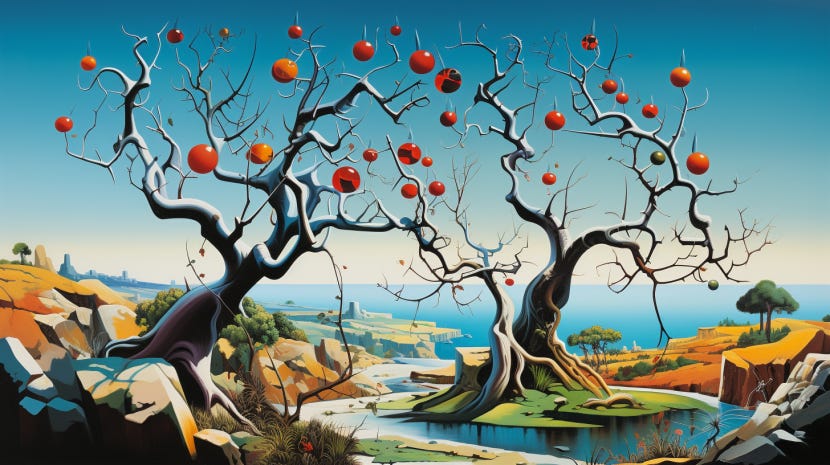
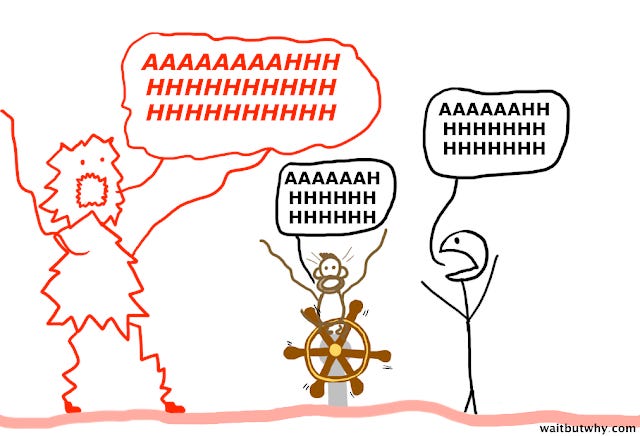
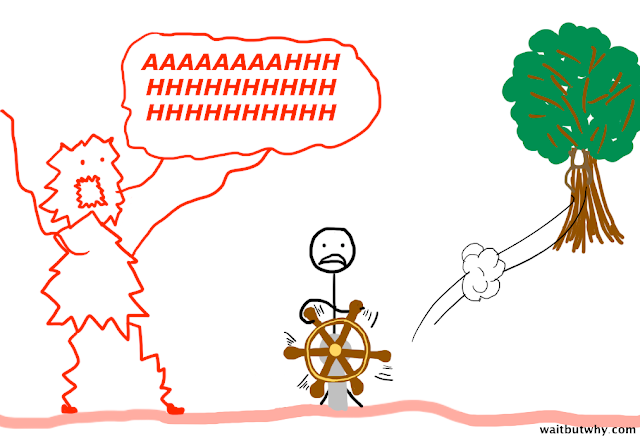

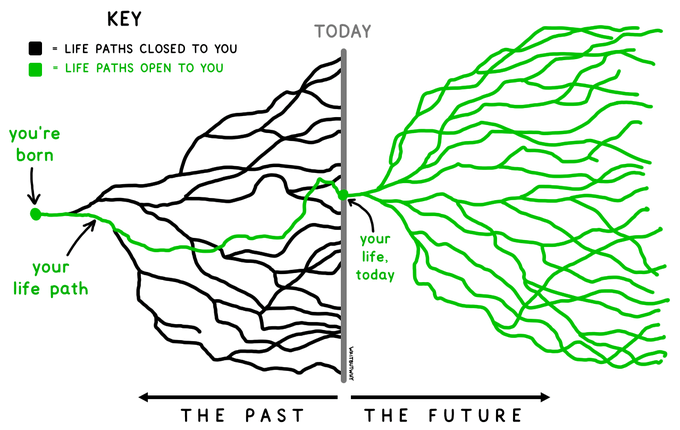
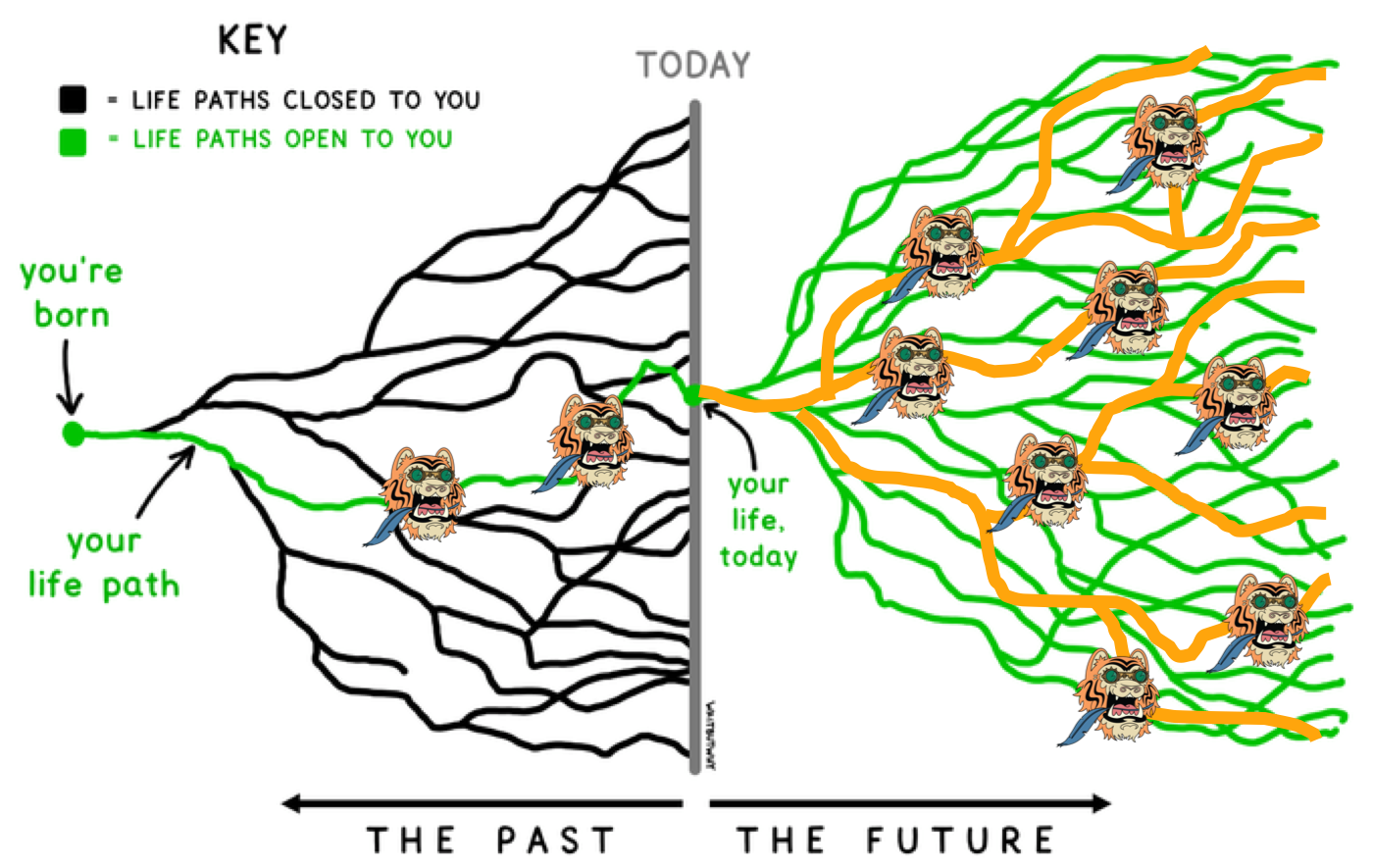
Rahul I loved this. Thank you so much for writing and sharing. It feels like millenium since we meet week 1. ✨
"The next step reveals the next step" As simple as it sounds, this is a profound thought. I'm going to keep reminding myself of this line to stay course. Thanks Rahul.